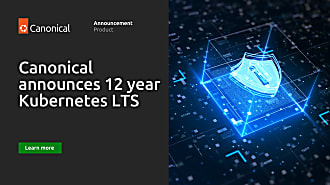Canonical
on 7 October 2010
Latest Ubuntu 10.10 Server Edition makes cloud deployment easier than ever
Canonical to sponsor users with free cloud time on Amazon EC2 to let users experience improvements for themselves
Canonical today announced the upcoming availability of Ubuntu 10.10 Server Edition for download on Sunday, October 10 — making it easier to configure, update and run both in development and deployment environments of public clouds.
“With Ubuntu 10.10 Server Edition we continue to make Ubuntu the default open-source choice for cloud computing,” said Neil Levine, VP of Corporate Services at Canonical. “We are adding features and functions that extend our lead in the public cloud and bridge the gap to hybrid and local computing environments. The infrastructure layer is the enabler of cloud computing and Ubuntu 10.10 is leading the way to put open source at the heart of those efforts.”
Already one of the most popular operating systems on Amazon EC2, Ubuntu 10.10 Server Edition gets kernel upgrades, more configuration options at boot time, and the ability to run the AMI (Amazon Machine Image) off-line on a KVM-virtualised machine. The latter feature means users can test and develop on local servers before pushing to the public cloud – true hybrid cloud computing.
Ubuntu 10.10 extends 'CloudInit', a configuration tool that allows users of Ubuntu on the cloud to set a default locale, set the hostname, generate and set up SSH private keys, and set up mount points. Users can also run custom commands and scripts on initial startup or on each reboot. The technology was recently adopted by Amazon itself.
To celebrate this and all the other features Ubuntu has implemented to make the cloud hum, Canonical is launching the 'Ubuntu Server on Cloud 10' programme. From the launch on 10.10.10, anyone will be able to try out Ubuntu 10.10 Server Edition on Amazon EC2 for free for one hour. Visitors to the download pages will now be able to choose to experience the ease and speed of public cloud computing and Ubuntu.
Additionally in Ubuntu 10.10, Ubuntu Enterprise Cloud adds virtio support, a new interface for administrators, eased deployment for developers and the ability to run UEC from a USB stick. Eucalyptus 2.0, the latest version of the core cloud technology in UEC, has been included. GlusterFS and Ceph have been integrated into the core product and the groundwork has been laid for many cloud-focused enterprise-scale applications to be introduced over the life cycle of Ubuntu 10.10 and the current LTS version (10.04) of Ubuntu Server.
Availability
Ubuntu 10.10 Server Edition, including Ubuntu Enterprise Cloud, will be widely available for free download from Sunday October 10 from http://dev.www.ubuntu.com.
Ubuntu Server on Cloud 10 will be available at launch and can be found at http://dev.www.ubuntu.com/server/get-ubuntu/download.
Useful links:
- Intel and Canonical whitepaper: http://software.intel.com/en-us/articles/intel-cloud-builder/
- Ubuntu Server user survey: http://dev.www.ubuntu.com/files/server-survey-2010.pdf
- Ubuntu Enterprise Cloud: http://dev.www.ubuntu.com/cloud
- Canonical cloud blogs: http://cloud.ubuntu.com
- Landscape server management system: http://dev.www.canonical.com/projects/landscape
About Canonical
Canonical provides engineering, online and professional services to Ubuntu partners and customers worldwide. As the company behind the Ubuntu project, Canonical is committed to the production and support of Ubuntu – an ever-popular and fast-growing open-source operating system. It aims to ensure that Ubuntu is available to every organisation and individual on servers, desktops, laptops and netbooks.
Canonical partners with computer hardware manufacturers to certify Ubuntu, provides migration, deployment, support and training services to businesses, and offers online services direct to end users. Canonical also builds and maintains collaborative, open-source development tools to ensure that organisations and individuals can participate fully in innovations within the open-source community. For more information, please visit dev.www.canonical.com.



